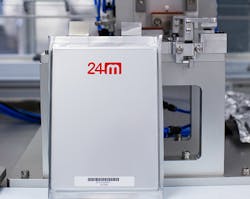Volkswagen Group and 24M Technologies partnering to develop future SemiSolid Li-Ion Batteries
German automaker Volkswagen Group has signed a strategic partnership with lithium-ion battery cell manufacturer 24M Technologies to develop SemiSolid battery cells, which will be used in Volkswagen’s EVs.
Volkswagen will leverage 24M’s SemiSolid platform to develop its next-generation lithium-ion EV batteries.
As part of this strategic partnership, the automaker will make a strategic investment in 24M and establish a wholly-owned subsidiary, which will work with 24M to develop the SemiSolid battery cell production technology.
“Together, we will approach key parts of the battery value chain and develop cutting-edge technologies,” said Thomas Schmall, Member of the Board of Management of Volkswagen Group for Technology and CEO of Volkswagen Group
The SemiSolid platform can be deployed immediately.
24M President and CEO Naoki Ota said, “The 24M mission is to develop a better, cleaner energy future powered by SemiSolid technology. Our relationship with Volkswagen significantly expands the 24M ecosystem. Their investment, collaborative development and ability to scale globally will accelerate the SemiSolid manufacturing platform to replace the conventional manufacturing process and fast track electric vehicle adoption.”
About the Author
EnergyTech Staff
Rod Walton is head of content for EnergyTech.com. He has spent 17 years covering the energy industry as a newspaper and trade journalist.
Walton formerly was energy writer and business editor at the Tulsa World. Later, he spent six years covering the electricity power sector for Pennwell and Clarion Events. He joined Endeavor and EnergyTech in November 2021.
He can be reached at [email protected].
EnergyTech is focused on the mission critical and large-scale energy users and their sustainability and resiliency goals. These include the commercial and industrial sectors, as well as the military, universities, data centers and microgrids.
Many large-scale energy users such as Fortune 500 companies, and mission-critical users such as military bases, universities, healthcare facilities, public safety and data centers, shifting their energy priorities to reach net-zero carbon goals within the coming decades. These include plans for renewable energy power purchase agreements, but also on-site resiliency projects such as microgrids, combined heat and power, rooftop solar, energy storage, digitalization and building efficiency upgrades.
